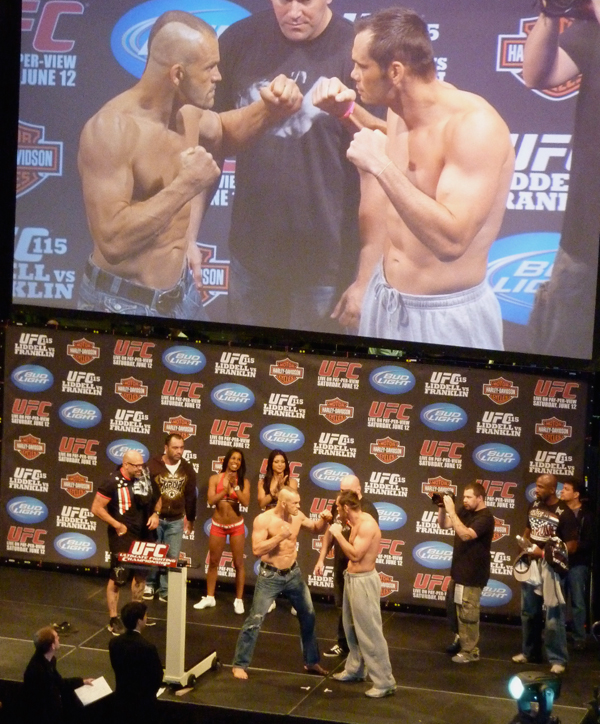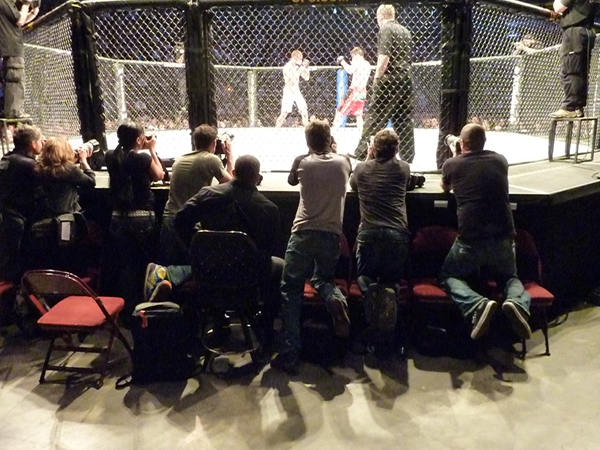When the Ultimate Fighting Championship first emerged from the swamp way back in 1993, it tried to answer that old barroom question about the alligator and the shark. "Who would win in a no-rules fight between a Brazilian jiu-jitsu master and a 300-pound sumo wrestler?"
It wasn't quite like that on Saturday night, when a kinder, gentler UFC finally arrived at GM Place. There were weight classes. Head-butting was not permitted. But the action was still brutal. You might say everything has changed. Or nothing. What, exactly, has the city bought into?
Five fighters were sent to hospital. The winner of the main bout, former schoolteacher Rich "Ace" Franklin, knocked out former Dancing with the Stars attraction Chuck "The Iceman" Liddell -- after Liddell had broken Franklin's arm. Montreal's David Loiseau bled profusely from a nasty gash in his head in a fight that many of the media felt should have been stopped earlier. The crowd loved it.
An hour after the event, near GM Place on Keefer Street, two gay men were attacked after they objected to a man they believe was a UFC fan urinating on a wall by their front door. David Holtzman said he was punched in the back of the head about 50 times while his attacker and another man uttered homophobic slurs. Police say they can't connect the assault to the UFC crowd, but both of the victims reportedly suffered concussions, and one was treated in hospital.
Politics of pummeling
Way back on December 17, Vancouver city council voted 6-3 to allow the UFC fight. Although no one was physically injured at the meeting, it also was a rather surreal spectacle. Council began by considering a bloodless but thoroughgoing staff report that recommended a two-year trial allowing mixed-martial arts events such as the UFC. Speaking to the issue were a smooth-talking American UFC lawyer, a martial arts hippie who views his passion not as "a way of fighting but a way of living," an old Hells Angels crony, and the Minister of Canadian Heritage James Moore.
A host of issues were considered. Will a UFC fight plug $1.5 million or $4.7 million into Vancouver's economy? Is the law that forbids UFC prizefights (but not amateur events) a meaningful prohibition or just a legal anachronism? What would council be allowing along with the UFC fight? What would the city's liability be? And, most strangely, is the serious-injury rate highest in mixed martial arts, boxing, hockey, or cheerleading? (According to a study by the University of North Carolina at Chapel Hill, it's cheerleading.)
At its core, however, the question of what to allow is more complicated and philosophical. What happens when our belief in civil liberties in a permissive society meet a vaguely Roman gladiatorial sport that uses the trappings of gang violence to market the sight of men elbowing their opponents in the bridge of the nose? Are the UFC punch-fests simply the basest of sports in a society that should tolerate a wide range of consensual human activity, or a vile gateway drug that can only lead to more violence?
Safe and sane?
Taking the, um, diversity view at that council meeting was Moore, the Port Moody-Westwood-Port Coquitlam MP and minister for Vancouver. He said the matter of whether the UFC bout is illegal under the Criminal Code of Canada is not an issue for the federal government, which has introduced Bill C-31 in the House of Commons to update rules that currently allow only very specific types of boxing. He argued that the three UFC events in Montreal went off without a hitch. And he urged council to welcome the UFC.
COPE Councillor Ellen Woodsworth is among those who takes the, ah, gateway drug position.
A day before the fight, the hockey-playing Woodsworth talked with The Tyee on her cell phone while riding her bicycle to City Hall. She cited policing costs, the Criminal Code status, and the provincial government's slowness to develop a regulatory framework as reasons why she voted against allowing the UFC fight.
At the core of her opposition, however, is the message UFC events send about violence, and particularly the message they send to children. As with public attitudes toward smoking, she wants to encourage a shift in our sensibilities.
The same is true for Vision Councillor Andrea Reimer, who with Woodsworth and Vision Councillor Raymond Louie opposed allowing the two-year trial. In a conversation with The Tyee, after watching the World Cup's opening soccer match, Reimer acknowledged that she'd have a more difficult time opposing MMA if the regulatory framework were as developed as it is for boxing. But, she said, she would still "have to go home and explain to my child why it's not okay to fight in the playground but it is okay for other people to make money from it."
Woodsworth, however, took the debate a step further. She called Moore's appearance before council unprecedented, and questioned his motives. Apparently it's not enough that Moore, an MP with a libertarian bent who broke ranks with his party to vote in favour of same-sex marriage, is a big fan of the sport. His support is all about polling, and playing to his political base, Woodsworth said.
Politics, also, can be a nasty business.
'I'm a big guy': Minister Moore
Moore spoke to me in April in a Port Moody Starbucks about his support for the UFC. "The issue goes back to my small government principles. Don't impose your views on me -- that goes for art, culture, and sport." Of his personal love of mixed martial arts, Moore said simply: "I'm a big guy -- I have a liking for the rougher sports." He added that while MMA was once "pretty brutal," now it's "properly regulated."
In considering how Vancouver should treat mixed martial arts in general and the UFC in particular, it's worth looking at how the sport has developed. In the 1990s, the lack of rules and regulation -- and an unconscionable lack of sportsmanship -- gave UFC events otherwise unachievable cachet. However, the sport took a few blows toward the end of the decade from Senator John McCain, who called it "human cockfighting." Never mind that McCain was ringside at a boxing match where an athlete was killed. As a result of the senator's aggressive campaign, the sport was restricted on television and banned in several states. Even the Nevada Athletic Commission refused to sanction UFC bouts.
However, the grassroots momentum of mixed martial arts was enormous, and it has now far surpassed boxing in popularity. MMA's incorporation of fighting traditions from around the world gives it international appeal -- it's huge, for example, in Japan and Brazil. In the United States, where boxing can be characterized as predominantly urban and black, MMA's advantage is that it is suburban and white.
In 2001, Dana White and his partners in the Las Vegas promotion company Zuffa LLC capitalized on this demographic momentum by purchasing the UFC franchise and carefully retooling and marketing the sport. Today, the athletes are employees of the company, and White, a former fighter, is arguably a bigger star than any of them.

Why do so many Canadians love it?
Unlike boxing, where you never know what crazy thing a Don King or Mike Tyson might do, and corralling the right combatants is as complex as negotiating a nuclear-arms-control treaty, the focus is mostly on the action in the ring. And when it's not -- when there's controversy about whether this province or that state will permit an event -- the publicity plays entirely into the fight promoters' hands.
In Canada, UFC pay-per-view audiences are, per capita, among the largest in the world. Is that because of Canada's relative lack, compared with the U.S., of heavily marketed professional sports? We are less black than the United States, but are we more suburban? Is it because of the stardom of Montreal fighter Georges St-Pierre? Whatever the reasons, an Ipsos Reid survey released this month suggested that in Ontario the sport is as popular as basketball, and while that province's government does not currently allow UFC events, about two thirds of those polled believe it should if other jurisdictions permit them.
Any argument that what the UFC offers is somehow less pure or noble or permissible than boxing, with its pretense of Marquis of Queensbury rules, is quickly becoming a matter of taste. Politicians and regulators are dealing with the new face of pugilism, and if they want to ban the UFC they will need to take a swing at boxing and hockey goons while they are at it.
Violent circus: look who's there
Not that much will come from the effort. On Saturday night at GM Place, the surrealism that preceded the event was in its fullest flower. James Moore was there, after offering his fight predictions on Twitter. Mayor Gregor "The Juice King" Robertson stood to cheer on the fighters. When Croatian fighter Mirko "Cro Cop" Filipovic threw his mouth guard into the crowd, men with baroque tattoos on their beefy forearms scrambled like schoolboys for the prize. Vancouver Sun crime reporter Kim Bolan blogged about the event, while keeping one eye out for the Integrated Gang Task Force and its quarry.
At the post-show press conference, Dana White thanked Vancouver for its support and declared: "We will definitely be back."
On Sunday, James Moore was off to a Coquitlam Teddy Bear Picnic. On Monday, Gregor Robertson was issuing a press release decrying the violence on Keefer Street. This week and next city councillors may wonder if they've done the right thing or the wrong one. What harm has come from allowing the UFC to come to Vancouver? Or would greater harm have been done by forbidding it? Should Vancouver have tried to hold the line, as it did with casino-style gambling, against an overwhelming tide? Or were we right to make the UFC another fixture in our city's strange pageant?
Dana White knows the answer. He's from Vegas, and in Vegas the house always wins. ![]()















Tyee Commenting Guidelines
Comments that violate guidelines risk being deleted, and violations may result in a temporary or permanent user ban. Maintain the spirit of good conversation to stay in the discussion.
*Please note The Tyee is not a forum for spreading misinformation about COVID-19, denying its existence or minimizing its risk to public health.
Do:
Do not: